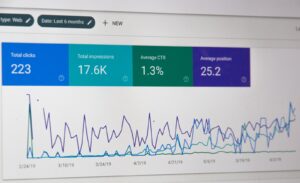
In the grand circus of online marketing, organic search engine optimization is the tightrope walker—elegantly balancing between being seen and being lost in the digital abyss. Imagine your website as a small-town diner that suddenly decided to serve gourmet meals; without the right strategies, it might remain undiscovered while foodies flock to flashier establishments down the road. So, how do you ensure your site doesn’t just exist but thrives in this chaotic carnival of clicks?
Fear not, dear reader! With five savvy strategies up your sleeve, you can transform your humble abode into a bustling hotspot for search engines and users alike. From mastering keywords like a seasoned chef perfecting their signature dish to building backlinks that are as sturdy as grandma’s secret recipe, let’s dive into the art of making Google fall head over heels for your content.
Many people find it difficult to get their website ranking high in search engines. But with the use of organic SEO strategies, you can increase your rankings on Google and Bing. These five strategies will get you started on the right path.
Use a proper title tag – since this is the text that shows up in a search engine's sponsored part of a page, having a title tag that matches your website's content is essential for getting click-throughs.
The number of organic searches for content has increased exponentially, and it is up to marketers to keep up. Organic search engine optimization (SEO) is one way to increase traffic and revenue. Here are some strategies that can help your SEO:
Make sure that you have a website map created and then submitted to Google Webmaster Tools. This will allow the crawler to index all the pages on your site, which will boost your ranking in search results.
There are many ways to get organic traffic to your website, but there is no better way than organic search engine optimization. The goal of SEO is to improve the site's ranking in the natural or unpaid search results on Google and other search engines and social media sites. A successful SEO strategy will focus on keyword research and content development.
Organic search engine optimization, often known as organic SEO, is one of the oldest and most battle-tested techniques of getting high positions in search results. It is one of the most effective Internet marketing tactics available today. Organic SEO is a method of improving a website's search engine ranks by creating highly relevant content that is related to the keyword phrases that consumers are looking for on the internet.
A range of on-site and off-site SEO tactics are available to help you obtain high ranks in the organic search results for certain keyword phrases. These strategies operate in unison to help you establish authority and trust with the search engines for the keyword phrases you want to rank for.
The following are five fundamental tactics that search engine optimization businesses use in order to enhance their customers' organic search engine optimization strategies.
Execute a thorough keyword research process: When it comes to organic search engine optimization, keyword research is the process of identifying the most advantageous key phrases that Internet users are looking for and that you should target for your campaign. First and foremost, you must identify who your target audience is and whether you will be targeting Internet users on a local, regional, national or worldwide scale before you can begin your keyword research.
To simply target local searchers, you'll want to identify keyword phrases that include geo-specific modifiers for the keywords you're attempting to rank for (i.e. Rental Cars in Atlanta or Atlanta Rental Cars.) There are a variety of excellent tools available that enable you to do keyword research in order to determine which words are being searched for on the Internet. For example, the Google Ads Keyword Tool, which is a free keyword analysis tool that provides phrases based on their search volumes and how competitive they are, is one of the most effective tools available.
Have effective SEO copywriting: Once you've identified the most beneficial keywords for your organic SEO campaign, you'll want to hire a professional SEO copywriter to create optimized web content for your website that incorporates these keywords in a way that is beneficial to organic SEO. Have a strong SEO copywriting strategy: Your website's pages should be devoted to one core keyword phrase or subject, and that keyword phrase or topic should be utilized throughout the web content on each page, strategically in header tags (H1, H2, H3, etc.) and throughout the body text to help your site rank higher in search engines. In addition, using strong tags on your keyword phrases informs the search engines that this term is more essential than the other words on your web page, so increasing your search engine ranking. Good SEO copywriting is a critical component of the overall effectiveness of your organic search engine optimization approach.
Improve the effectiveness of your meta tags: These are descriptive tags that notify search engines about the content of your web page (also known as meta tags). There are three major Meta tags that you may improve for organic SEO benefits: title, description, and keywords. The Title tag is the first of these tags. The title tag, which appears at the very top of each page on the search engine results page (SERP), should include your desired keyword phrase towards the beginning of the title tag, as seen in the example below. Similarly, the meta Description tag, which is the second most significant meta tag that you may optimize, falls into this category as well. Meta Description tags are a concise 170-200 character text block that appears just under the page URL on search engine results pages.
When optimizing your web page for organic SEO, it is great practice to include your desired keyword as well as a variant of that phrase in the content. This is the last meta tag I'll examine, since it has grown less and less relevant for organic search engine optimization over time. This tag was often exploited by SEO agencies, who crammed it full of every term under the sun into the tag. Google no longer takes this element into consideration when determining how highly a website ranks for certain keywords. I still use it, however, since it's the equivalent of putting a I in your meta tags. Don't overcrowd the tag with keywords, but do include your primary keyword phrase as well as a few closely related keyword variants in the tag.
Make use of URL formats that are search engine friendly: Your website's URLs should also include your chosen keywords in the URL structure. In order to operate in conjunction with your optimized web content and meta tags, search engine friendly URLs must include the same targeted keyword phrases as your optimized web copy and meta tags. It all adds up to make your web page extremely relevant to the keyword phrase that you are targeting with your organic search campaign if your web page has the same targeted keywords in the Meta tags, in the body content, and in its URL.
Start a content marketing strategy: After your website has been properly optimized for organic SEO, the next step you should do is to launch a content marketing campaign that will aid in the creation of links to your website. Establishing a network of connections between your web pages helps to establish your web page's authority on the specific issue it addresses. The most effective method of obtaining these connections is by blogging and article writing, as well as providing other material to other websites, such as videos and press releases, that contribute to the development of your online presence and the creation of links back to your website. It is essential to have an off-site content marketing plan in place if you want to achieve long-term organic SEO success.
Optimizing your website is less about tricking search engines and more about winning hearts (and clicks). Think of it as cultivating a garden—nurturing quality content and watching it bloom will attract visitors like bees to honey. Sure, there may be weeds along the way (looking at you, algorithm updates), but with diligence and creativity, your online presence can flourish.
So go forth with confidence! Armed with these five strategies, you’re now ready to tackle the wild world of SEO like a pro. Keep experimenting, stay curious, and who knows? You might just find yourself at the top of those coveted search results—where all great diners deserve to be!
Suggested External Resources:
Moz's Beginner's Guide to SEO
https://moz.com/beginners-guide-to-seo
Ahrefs Blog on SEO Strategies
https://ahrefs.com/blog/seo-strategies/
Search Engine Journal's Organic SEO Tips
https://www.searchenginejournal.com/organic-seo-tips/





